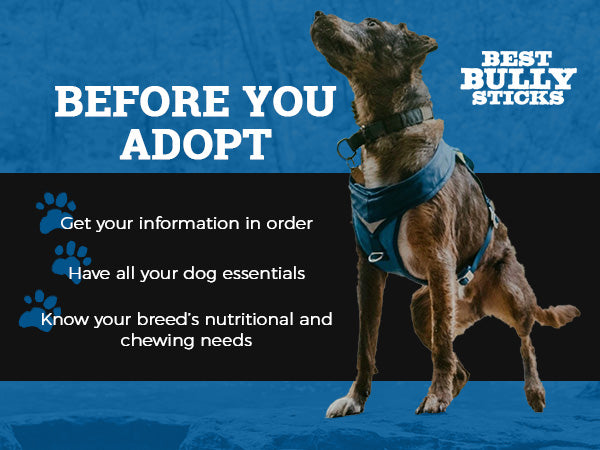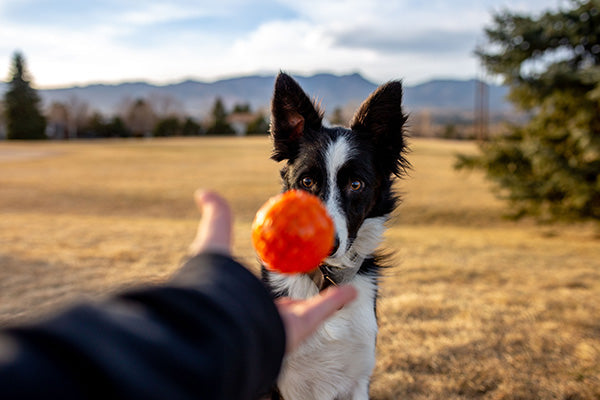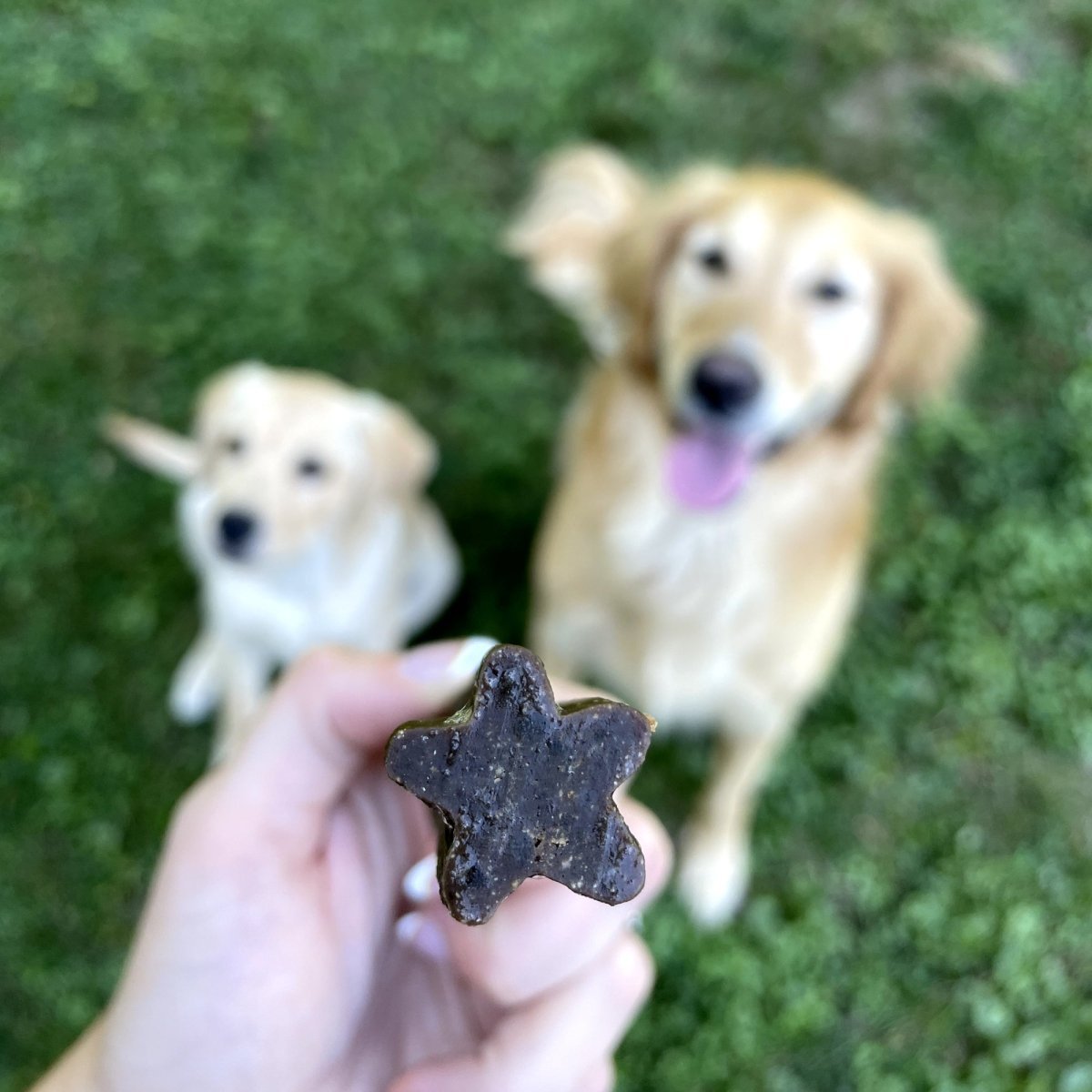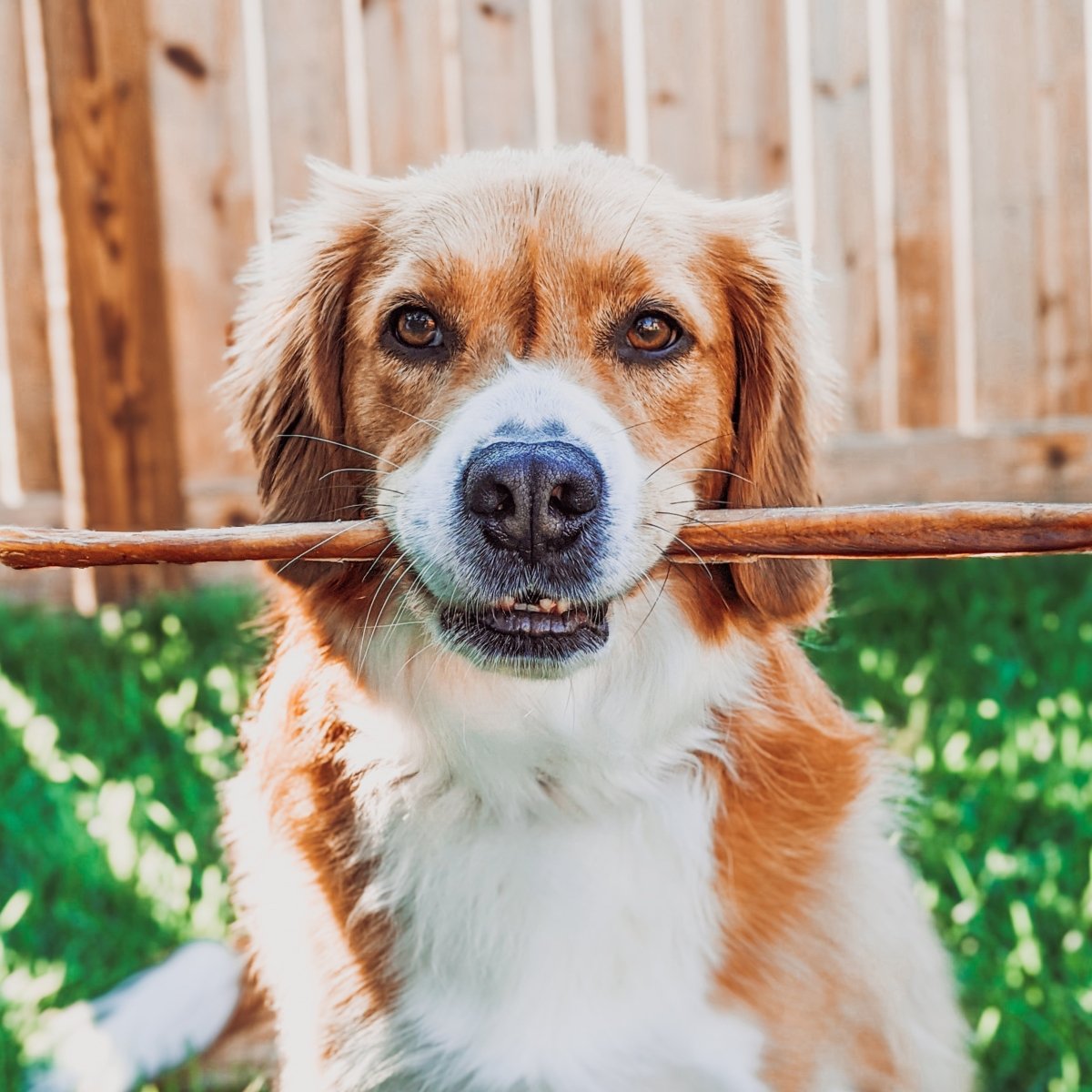

Adopting a dog is one of the greatest accomplishments in life for many people. Whether it’s your first or tenth time, bringing a dog into your home is an incredible feeling.
But if you’re new to the adoption process, where do you even begin? What do you need to adopt a dog? Better yet, what type of dog is right for your lifestyle?
It’s a good idea to do your research prior to reaching out to an adoption agency. To ensure you get started off on the right foot, you’ll want to get all your information in order, have all the dog essentials stored away, and know your way around your breed’s nutritional and chewing needs.
So what should you ask yourself prior to the adoption process? The following questions and considerations can help you adopt your best friend.

Before you adopt a dog, you’re going to want to ask yourself some ancillary questions. These include the following:
It might sound like a lot to ask yourself from the jump, but it’s imperative you do so for the sake of your dog. Adopting a dog is like bringing a new child into your home, and the amount of care will be similar. You want to make sure you’re absolutely ready for the commitment.

Along with knowing your baseline requirements and accommodations, you also need to consider what you can viably handle. For instance, what type of dog are you able to deal with at this time and in the coming decade? Ask yourself questions like:
Beyond finances and physical space, it’s smart to think about your future dog’s routine. In particular, do you have the time for a dog? Your dog will need to be fed and walked a few times a day, sometimes more, depending on the age of the dog. How will this affect your decision? Consider the following:
We’ve mentioned it a few times, and the time has come to discuss it: finances. Do you have the finances to appropriately care for a dog?

Basic annual dog costs tend to be, at a minimum, around $1,400. But that only covers food, bedding, and basic vet care. Costs can become much higher with minor changes, whether your dog is growing and needs a new collar, harness, bed, and food bowls or if they need serious medical care.
The adoption cost is just the start of your payments. After that, you should take your dog’s monthly costs into account when budgeting. Here are some of the basics that can add up rather quickly:

So you’ve been approved and you’re adopting a puppy? They’re sure to be over the moon from being adopted, introduced to their new family, and invited into their forever home.
Here’s what you’ll need to make sure they’re comfortable when you bring them home. And the following doesn’t just stop at puppies. Adult and senior dogs can benefit from the following tools and goods, too.
Schedule an appointment with your dog’s vet once you know you’ll be picking them up. You should schedule it for soon after you welcome them into your home. This will ensure you’re able to get all of their vaccinations along with performing a routine physical to check their overall health.
While you might feel compelled to let them sleep in your bed, you probably shouldn’t start them off with it. You’ll want to establish boundaries in the home so they maintain some of their individual characteristics; otherwise, they’ll become too dependent and separation anxiety will be a serious issue if you ever have to travel without them.
Similarly, dogs appreciate having their own spaces! Whether it be a cozy, isolated bed or a crate where they can be left alone, they enjoy having space where they can relax by themselves.
Be sure to get a proper crate and bedding for your dog to safely train and transport them, along with giving them a place to rest.
Beyond getting a crate for training, sleep, and the occasional time-out, you should buy a good quality food and water bowl. Make sure you get something durable. You don’t want something made of plastic which your dog can bite through and end up eating. We recommend getting stainless steel bowls, as they’re easy to clean and hypoallergenic.

Now that you’ve got bowls to feed and hydrate them, you’ll want to find the right goods to satiate them. For daily food, you should look for healthy dry dog foods that will benefit your dog’s overall health, rather than feeding them overly-processed kibble.
Along with that, you should reach for all-natural, long-lasting dog chews that will taste great, improve their dental health, and better their nutritional intake. Our 100 percent natural dog chews and dog bones provide just that. Your dog is sure to love the smell and taste of them, all while being able to gnaw on them for a good amount of time.
Browse Dog ChewsDon’t let your dog tear apart your couch cushions or their blanket. Give them some essential toys and plushies that they can get their energy out with. Large stuffed animals are a plus, as it will give something for your dog to both snuggle up with and throw around. Whether it’s a fluffy bison or a big sock monkey, they’re sure to fall in love with it.
You’ll want to get the right walking tools for your dog. That means finding cute harnesses, collars and leashes that physically fit and match their personality.
Harnesses are great for dogs that tend to pull, as the distribution of pressure will calm them down during your walks. But you can never go wrong with a collar, especially one that is customized to their personality.
You’ll also need to think of what leash you need. State leash laws dictate the maximum length leash you can use in public spaces, both for the safety of your dog, other dogs, and bystanders. Ensure you’re following the rules, both for your dog’s safety and the safety of those around you.
You can always call a professional, but it’s more affordable to regularly groom your dog at home. Buy some dog-specific shampoos and a sturdy wire brush to regularly clean their coat. It will keep them looking fresh and revitalized.
Lastly, accidents will happen. Your dog is getting used to a new space and schedule, and you might not get them outside before they need to “go.” Stock up on various home cleaners to take care of any accidents that happen, whether it’s a bathroom mistake or a smell you just can’t get out of the carpet.
Now that you’ve been approved, all there’s left to do is bring your new dog home. Ready to welcome them with open arms, whether from the shelter’s front doors or when taking them from their foster parents? Show up with dog chews to keep their attention during the drive home.
Or keep them for once they get home and you want to put them at ease. They’ll be sure to relax once they have one of many bully sticks to chew and gnaw on.
Shop Bully SticksComments will be approved before showing up.

Dental chews keep plaque in check and gums strong. Read here to learn about nature's toothbrush!

Single-ingredient dog chews and treats are crafted using only one whole food source!

Check out our guide on different types of chews to help you decide on the best chew for your dog!